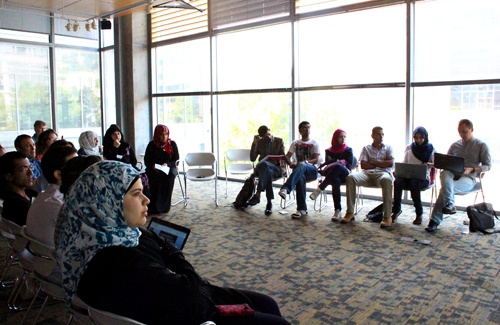Mohamed “Hamza” Khaouti comes from Marrakech, a city that’s 1,200 years old.
From Marrakech to Portland
Mohamed “Hamza” Khaouti comes from Marrakech, a city that’s 1,200 years old.
At 18 years old he already speaks four or five languages—no big deal back home, he explains: “That is typical in Morocco.”

He’s the youngest of 18 participants in the U.S. Department of State’s Middle East Partnership Initiative Student Leaders Program, visiting PSU in the program’s inaugural visit to the university this summer.
The participants come from the Middle East, North Africa or the Palestinian territories, thanks to a $235,000 U.S. Department of State grant, and are part of a larger group of 120 student leaders who traveled from the Arab world to Washington, D.C. June 26 to begin the ninth MEPI exchange program. They split into small groups and traveled to one of six host universities.
“Portland is not typically what you think of when you think of an international experience,” said Esther Lim, the program coordinator for MEPI at Portland State. “You think of Boston or New York, but [the MEPI students] are like ‘We love Portland!’ They love ‘Keep Portland Weird.’”
In addition to refining leadership skills, the students learn about democratic processes and how to implement democratic policies in their home countries. PSU has partnered with Mercy Corps, which is teaching MEPI students techniques for leading social change. They’ve also partnered with Student Leaders for Service and are working at sites like the MacDonald Center in downtown Portland, which serves people living in poverty or with mental illness.
Admission into the MEPI program is highly selective. “This is the cream of the crop,” Lim said. According to Khaouti, he was one of about 400 Moroccan students who applied for the exchange. Only six were chosen. In order to qualify, students must never have traveled to the U.S. or abroad and must speak English.
In a foreign city, the students still find elements of home. “We found this Egyptian guy at a food cart,” said Diala Al Masri, 19, who hails from Beirut. The students befriended the vendor, who then promised to help the Muslim MEPI students celebrate Eid al-Fitr, the Muslim holiday marking the end of the month of Ramadan, which begins July 20.
Their first week in Portland, the students parted ways for home stays. “They were terrified [to go],” said Amy Spring, the program’s director. Host families took the students fishing, even snowball fighting. “They came back delighted.”
“One girl from Kuwait, she wears hijab and abaya, and her [host] family asked her lots of questions about being covered. At first she was nervous, but then she realized they’re just curious. So here comes the joy for me (in having MEPI students here): How cool is it for us that we are able to learn from them about them?” Spring wondered.
The Student Leaders Program is under the broader MEPI program funded by the U.S. Department of State, which encourages reform in the Middle East and North Africa, emphasizing strong civil societies, empowerment of women and youth, expansion of education, and economic and political reform. MEPI was founded in 2002.
The program was designed by the Bush administration after 9/11, said Christopher Carey, associate professor of university studies. Carey taught the first component, Intro to Democracy, of the MEPI academic program this summer.
“[The students and I] have discussed this program explicitly. We’ve discussed whether this program is to turn them into young Americans…but I think this program brings people in the Arab world closer together, and I think the best thing it does is benefit the people they interact with here in the states. It dispels stereotypes,” Carey said.
Kevin Kecskes, the director for community-university partnerships and the principal investigator of PSU’s MEPI grant, agrees.
“What’s a 20 on the 10 scale for me is that they meet hundreds of normal American citizens with whom they have the opportunity to connect on a human level. Because of programs like this we have a way to learn about our common humanity. That is precious.”
Kecskes will teach the second academic component of the program: Civic Engagement.
In normal American fashion, the MEPI students gathered in Kecskes’ backyard for the Fourth of July.
“We had a traditional American barbecue. We had 16 countries represented—17 with the Americans. Actually, we had a Swiss and a Canadian, too, so there were 19 countries represented in my backyard,” he said. “The students put on music from their own iPods. They were dancing traditional dances. It was shudderingly special. The taste of that remains.”





